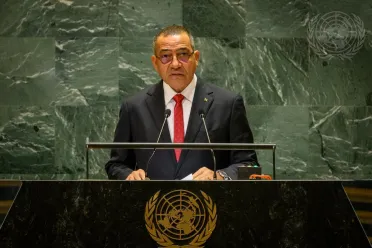Statement
Statement summary
CARLOS MANUEL VILA NOVA, President of Sao Tome and Principe, said that as a small island developing State, his country bears the brunt of climate change, which represents the greatest existential threat to the country. Worse, even though Sao Tome and Principe produces only a tiny portion of greenhouse gases, it suffers the most from the effects of climate change, including sea level rise, coastal erosion and a loss of biodiversity, threatening all lives on the island. The international community must respect commitments made in the Paris Agreement on climate change and listen to the most affected countries, he said, calling for ambitious, global, concrete actions. The upcoming UN Climate Change Conference in Baku is a crucial moment to reaffirm a collective commitment to limit global warming to 1.5°C. Concrete actions must address the impacts of climate change, and the largest emitters must fulfil their “historical and moral” obligations in reducing their emissions while also honouring their promises of climate financing to developing countries, he said. Moreover, adaptation mechanisms must be funded.
Though the country is already investing in solutions such as sustainable use of marine resources and renewable energies, support is required for scaling up those solutions to be fit to task. Sustainable development is not a choice for Sao Tome and Principe but a necessity, and against the backdrop of the rapidly approaching deadline for the 2030 Agenda for Sustainable Development, much progress remains. Support for development must be renewed, and new models of partnership between States must be explored, he said. Without an international environment that promotes free trade and peace, the country’s efforts will be hampered. The importance of strengthening multilateralism and ensuring that all States, regardless of size and economic power, have a voice cannot be understated. “Multilateralism is our best tool for tackling collective challenges that transcend borders,” he added.
Turning to Africa, he said that the continent continues to be the scene of protracted conflicts requiring diplomatic intervention and African solutions for African problems in respect of the sovereignty of States. Addressing conflicts in the Middle East, he said that diplomatic efforts must be redoubled for the peaceful resolution of conflicts, adding: “There can be no development without peace, and peace is only possible with justice.”
“The future we want must be built on the foundations of cooperation, solidarity and mutual understanding,” he recalled, underlining that COVID‑19 illuminated the reality of interdependence of nations and the need for cooperation to address global challenges. “The world’s current affliction is not inevitable,” he said. Without the United Nations and with all countries divided, the world will fall into conflict, he said, hailing multilateralism. However, the world has changed since the Organization’s inception and must evolve. Sao Tome and Principe advocates for Security Council reform, in particular “the need to think of Africa as a part of the world”. The Council cannot continue reflecting the same power structures of 1945, a time of colonization, he urged. Finally, turning to other global affairs, he called for an end to the unjust embargo on Cuba and reaffirmed support for Morocco’s sovereignty as well the country’s efforts to find a “peaceful and credible solution to the dispute” as well as the Morocco-Nigeria pipeline initiative, which reflects regional integration and sustainable growth.

